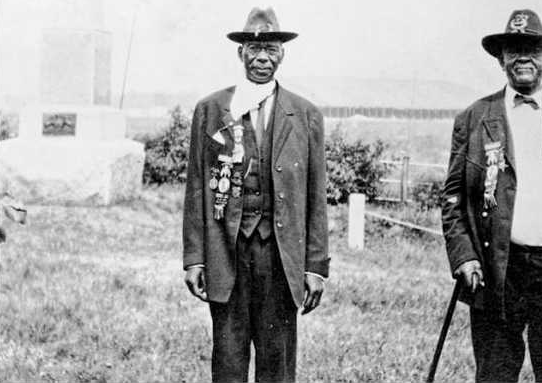Did I Forget Someone?
 Greetings!
Well, in short, the answer is no. But allow me to explain. When I was conducting research on the commemorative efforts of Civil War veterans for my dissertation, giving papers on the topic, and years later, revising the diss for publication as Across the Bloody Chasm, I ran up against a good many people who found it potentially problematic that I wrote only of white Civil War veterans. They questioned: did I overlook, dismiss, or find their commemorative efforts not worthy of analysis? Of course I did not.
Greetings!
Well, in short, the answer is no. But allow me to explain. When I was conducting research on the commemorative efforts of Civil War veterans for my dissertation, giving papers on the topic, and years later, revising the diss for publication as Across the Bloody Chasm, I ran up against a good many people who found it potentially problematic that I wrote only of white Civil War veterans. They questioned: did I overlook, dismiss, or find their commemorative efforts not worthy of analysis? Of course I did not.
Let me assure you I greatly value and hold in the highest esteem the work of black Civil War Union veterans. I believe that there is much one can offer concerning their commemorations by way of investigation. But though many admonished that readers and reviewers would take me to task for leaving black veterans out of my story, I decided, with deliberate intention, not to discuss their commemorative culture.
I will note two reasons for this decision:
First, two historians have recently published excellent studies on black veterans. Donald R. Shaffer's After the Glory and Barbara A. Gannon's The Won Cause are both magnificent works that focus on black veteran struggles after the war, having won a sense of manliness as soldiers, and black and white comradeship in the Grand Army of the Republic, the preeminent Union veterans' organization. While I contend that no book is the final word on anything, these two studies generally reflect my personal thoughts on black veterans (thoughts that resonate loudly in the archival record), and I do not feel (at least, not for now) that I could have added anything significant to build on what Shaffer and Gannon have already so elegantly accomplished.
Second, I was looking for the voice of the majority, in essence to learn if there was something crucial and overlooked that drove the general spirit of soldiers' commemorations against a backdrop of national reconciliation in the latter decades of the nineteenth century and the first decades of the twentieth. I believe it goes without saying that the overwhelming majority of the men who shouldered muskets in the Civil War were white. The Confederacy fielded about o% (+/- .0001%) of their military age black men in combat roles, and the Union enlisted roughly 179,000 black fighting men to march into battle with the USCT and other black regiments - a shade short of 10% of the Union army. Combined, well over 3 million men served between 1861 and 1865. Clearly, black soldiers made up only a small fraction of the armies. Moving on, it made perfect sense that after the conflict black veterans would acknowledge slavery as the central cause of the war and celebrate emancipation as its consequence - no matter what anyone else said. Nothing surprising here.
My argument was with the predominating "reconciliationist premise" literature (David Blight's work especially but also numerous others) that claimed white veterans put aside divisive issues in the name of an entirely benign and whitewashed reconciliation on southern terms.
With rare exception, they did not. In fact, many on both sides discussed with great vehemence war issues such as slavery and emancipation through any number of commemorative activities. And they went further than that, taking on highly volatile topics such as treason, tyranny, and the original intentions of the founders. Those who attended veterans' gatherings or wrote narratives and recollections were bent on preserving memories, not whiting them out.
So it seems that white Civil War veterans - the majority of those who fought - did not dismiss war issues as readily as some scholars would have you think. They were perfectly willing to reconcile, but only on terms of their choosing - all the while acknowledging that the other side was profoundly wrong. As you might imagine, that did not work out so well. This is the story that I offer. You will have to read my book to see if I executed it successfully.
With compliments,
Keith